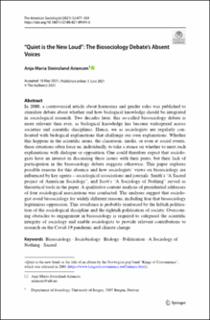| dc.contributor.author | Ariansen, Anja Maria Steinsland | |
| dc.date.accessioned | 2022-03-07T08:54:16Z | |
| dc.date.available | 2022-03-07T08:54:16Z | |
| dc.date.created | 2022-01-10T11:39:22Z | |
| dc.date.issued | 2021 | |
| dc.identifier.issn | 0003-1232 | |
| dc.identifier.uri | https://hdl.handle.net/11250/2983319 | |
| dc.description.abstract | In 2000, a controversial article about hormones and gender roles was published to stimulate debate about whether and how biological knowledge should be integrated in sociological research. Two decades later, this so-called biosociology debate is more relevant than ever, as biological knowledge has become widespread across societies and scientific disciplines. Hence, we as sociologists are regularly confronted with biological explanations that challenge our own explanations. Whether this happens in the scientific arena, the classroom, media, or even at social events, these situations often force us, individually, to take a stance on whether to meet such explanations with dialogue or opposition. One could therefore expect that sociologists have an interest in discussing these issues with their peers, but their lack of participation in the biosociology debate suggests otherwise. This paper explores possible reasons for this absence and how sociologists’ views on biosociology are influenced by key agents – sociological associations and journals. Smith’s “A Sacred project of American Sociology”, and Scott’s “A Sociology of Nothing” served as theoretical tools in the paper. A qualitative content analysis of presidential addresses of four sociological associations was conducted. The analyses suggest that sociologist avoid biosociology for widely different reasons, including fear that biosociology legitimizes oppression. This avoidance is probably reinforced by the leftish politization of the sociological discipline and the rightish politization of society. Overcoming obstacles to engagement in biosociology is required to safeguard the scientific integrity of sociology and enable sociologists to provide relevant contributions to research on the Covid-19 pandemic and climate change. | en_US |
| dc.language.iso | eng | en_US |
| dc.publisher | Springer | en_US |
| dc.rights | Navngivelse 4.0 Internasjonal | * |
| dc.rights.uri | http://creativecommons.org/licenses/by/4.0/deed.no | * |
| dc.title | “Quiet is the New Loud”: The Biosociology Debate’s Absent Voices | en_US |
| dc.type | Journal article | en_US |
| dc.type | Peer reviewed | en_US |
| dc.description.version | publishedVersion | en_US |
| dc.rights.holder | Copyright The Author(s) 2021 | en_US |
| cristin.ispublished | true | |
| cristin.fulltext | original | |
| cristin.qualitycode | 1 | |
| dc.identifier.doi | 10.1007/s12108-021-09494-0 | |
| dc.identifier.cristin | 1977388 | |
| dc.source.journal | The American Sociologist | en_US |
| dc.source.pagenumber | 477-504 | en_US |
| dc.identifier.citation | The American Sociologist. 2021, 52, 477-504. | en_US |
| dc.source.volume | 52 | en_US |

